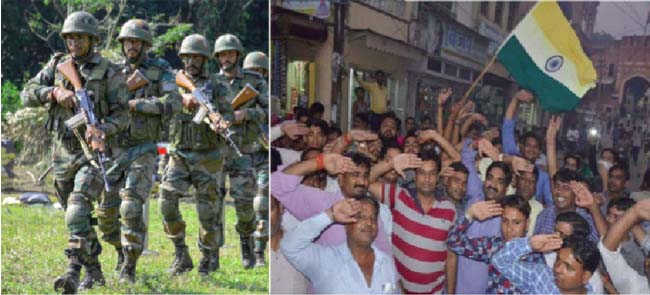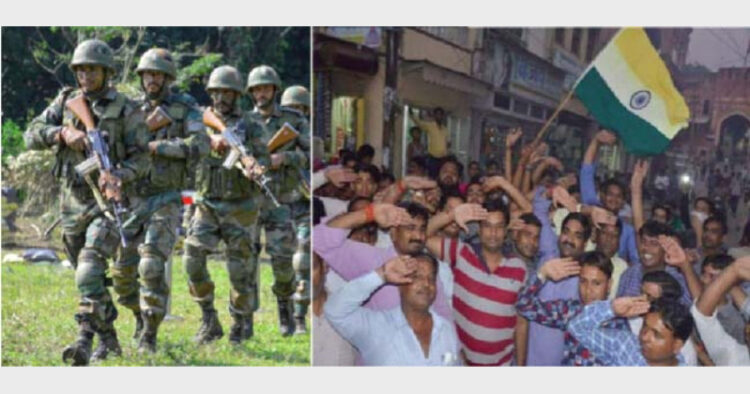In the modern world, a citizen’s role has changed from being an active cheerleader to being an active soldier, albeit without guns. Just as conventional soldiers resist territorial invasion and launch counter operations, civilian soldiers must resist cognitive invasion and launch offensives of their own
–Deepanshu Aggarwal

Every Indian citizen is equally responsible for the security
of the country just as our soldiers who guard the borders
of the country just as our soldiers who guard the borders
“Peace is maintained by the equilibrium of forces, and will continue just as long as this equilibrium exists, and no longer.” wrote Carl von Clausewitz, the great Prussian military general in his magnum opus ‘On War’. Multiple times in our history, has this ‘equilibrium of forces’ been disturbed, resulting in destructive wars. Unlike the economic equilibrium, defined by Adam Smith being achieved through the workings of an invisible hand of the market, the power equilibrium is achieved through the conspicuous manoeuvrings of a human hand. And Simon Booy said that “hands have their own language”.
Well, the language has changed today. This means that the nature of war has changed. What used to be conventional warfare, fought with conventional weapons employing battlefield tactics, has now metamorphosed into something unconventional. Imagine, a citizen in a country wakes up in its house only to see the power off, the city’s public transportation broken down and its staple cereal absent from all the supermarkets in the city/country. While three decades back, this could be a result of a state’s implementing a communist manifesto, in today’s times, it is highly possible that that citizen’s country has been ‘attacked’ by another country. Not every attack uses dynamite!
Purely military in nature in the past, warfare has now entered economic, technological, biological and cognitive realms. This change has radically altered the various aspects of the war : weapons, war territory and most importantly, the hierarchy of the participation in the war. Earlier, the engagement was largely restricted to border frontiers, which were only a part of a country’s entire territory. However, with the contests also becoming economical/cognitive etc. in nature, the territorial restrictions have vanished and the warring countries’ individual components, from human resources to non-military infrastructure, have become a battlefront in themselves. Technology is a factor too. It is both an enabler of and a weapon in modern warfare.
From hacking a country’s public/private digital resources to destroying its nuclear infrastructure, technological warfare has announced its arrival. And so has informational warfare, wherein a bombardment of ‘information’ (propaganda and fake news) plays with the belief systems of a rival country’s citizens, reducing the citizens’ faith or trust in their national institutions.
It is this information warfare, apart from conventional one, that defines the Indo-China standoff at the Line of Actual Control in the Ladakh region. Seemingly military in nature and Himalayan in its location, the standoff also witnessed an information warfare that sought to attack our belief in the strength and integrity of our defence forces and the government respectively. The information onslaught came from China and from even within India through multiple avenues : newspapers, news television channels, social media handles etc. What united these disparate nodes was either their deep rooted antipathy towards the governing nationalist regime at the centre or their perennial penchant for communism. They together spun a narrative of the Indian government giving in to Chinese aggression and losing its territory to Chinese invasion.
A prominent news channel, known to have a soft corner for the communist ecosystem, did multiple fake news stories on the standoff, one of which had a headline “Indian Jawans Detained By Chinese Last Week, Freed Later. Army Denies” (May 24, 2020). Now the only problem with this news was that it was fake news! The channel exploited the general ignorance that civilians display in matters of military, geography and strategy. It used defence ‘experts’ as props to narrate a seemingly coherent viewpoint. A perfect weapon of information warfare.
The intensity of information warfare reached a point where even our Prime Minister’s incontrovertible statement on India’s territorial integrity being intact was presented as an admission of defeat against the Chinese PLA! Ludicrous yet lethal, isn’t it? Which is why it is now believed that unconventional warfare has altered the hierarchy of participation in a war.
Earlier, citizens of a country were meant to only cheer and pray for their military engaged in a standoff. A nation’s people had no direct/indirect participation in the war. It was because the battlefront was thousands of kilometers away and the lives at stake were those of the warring soldiers. Also, the war frontier was limited to being geographical in nature. However, with warfare entering a domain as pervasive and integral as information technology, citizens’ role and participation has become important. It is because the war is now also waged in a country’s citizens’ mind. What used to only happen away in a far-off geographical setting now also happens deep within the cognitive settings of a country’s citizens. Thus, a citizen’s role has changed from being an active cheerleader to being an active soldier, albeit without guns. Just as conventional soldiers resist territorial invasion and launch counter operations, civilian soldiers must resist cognitive invasion and launch offensives of their own.
Along with information warfare, there exists economic warfare wherein countries perversely leverage their mercantile strength in order to attack another country. The implications of economic warfare are far reaching. If information warfare is about invading cognitive territory then economic warfare is about invading the economic one. The presence of a rival country’s goods in the domestic economic sphere is akin to an enemy soldier’s presence on domestic soil. Thus, a citizen, as an important economic unit of its country’s economic edifice, needs to see itself as an active soldier who wouldn’t allow the economic invasion to take place.
The change in the nature of war has put greater responsibility on an average citizen in matters of national security
Thus, the change requires us to see the enemy not just as a military unit, but also as an economic and information unit looking to attack us on all these fronts. Therefore, the change in the nature of war has put greater responsibility on an average citizen in matters of national security. Every act that it does, as an economic/cognitive unit of the country, is akin to a strategic move that will decide the fate of its country. It’s said that “Sometimes you have to pick the gun up to put the gun down.” Well, modern guns are made of internet and trade deals.
(The author is a researcher at Observer Research Foundation and writes on political economy, governance & public-policy )













Comments